You are hereBlogs / WcP.Story.Teller's blog / Giving Pledge: wealthy families give at least half their wealth to make a better world. Philanthropy 50 who gave most in 2009
Giving Pledge: wealthy families give at least half their wealth to make a better world. Philanthropy 50 who gave most in 2009
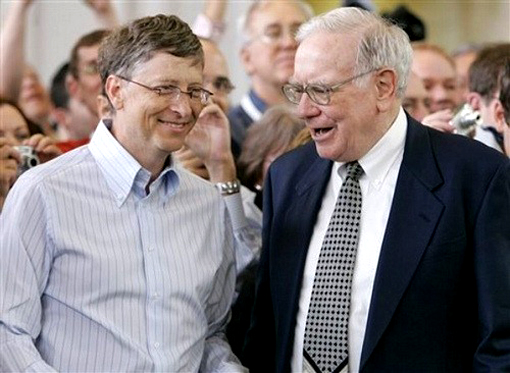

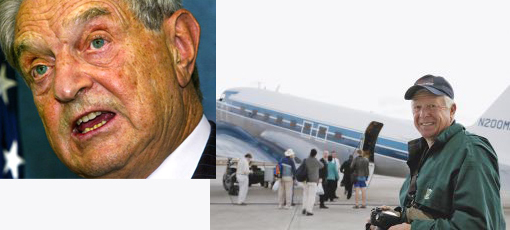
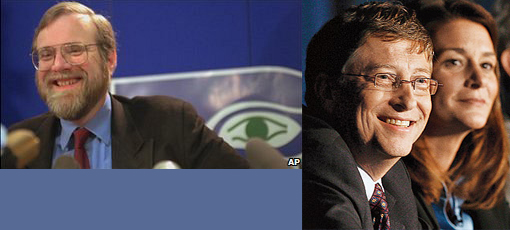
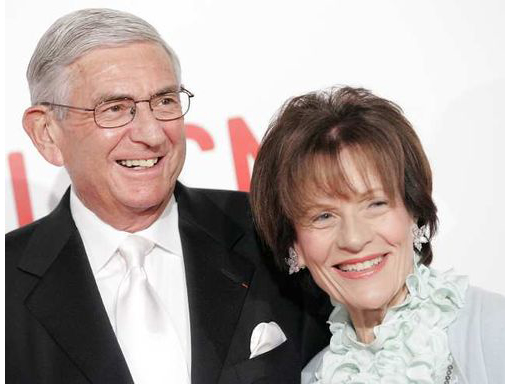
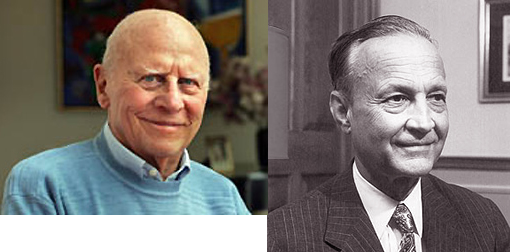
(quote)
The Giving Pledge, the effort of Warren Buffett and Bill Gates to encourage billionaires to commit to giving away at least half their wealth. Announced in June, the Giving Pledge now includes 57 families from across the United States. Additionally, both Buffett and the Gateses have begun conversations with billionaires from other countries to learn about their philanthropy efforts and what has worked in their countries.
The Real Intent of the Giving Pledge: When the Pledge was first announced, I argued that while all the world’s billionaires signing on would be great, the real potential of the Pledge was that it might spur every day Americans to increase their involvement in philanthropy. I pointed to statistics that showed how a shift in giving behavior by every day Americans could have a 10 times larger impact on the amount of money given each year than a shift by billionaires.
In a press conference held after the initial announcement, Warren Buffett spoke about his hopes for the Pledge and said, “We want the general level of giving to step up…We want the Pledge to help society become even more generous. We hope the norm will change towards even greater and smarter philanthropy…” In the newest release, the Pledge organizers make clear the focus on this goal by quoting Peter Singer, a noted advocate for people from all walks of life to give a much higher percentage of their income to charity:
“The Giving Pledge is about changing the culture of giving. Research shows that when people know that others are giving, they are themselves more likely to give. So publicly pledging to give will encourage others to give. This holds true for billionaires and for those of us who aren’t anywhere near that level of wealth. We can all make a difference, and play our part in making the world a better place.”
The Philanthropy 50: Americans Who Gave the Most in 2009
Rank | Donor | Total amount committed | Years on list
1 Stanley F. and Fiona B. Druckenmiller $705,000,000 1
Finance
2 John M. Templeton $573,000,000 2
Finance
Bequest
3 William H. (Bill) III and Melinda F. Gates $350,000,000 5
Technology
4 Michael R. Bloomberg $254,000,000 6
Media and entertainment
Estimated
5 Louise Dieterle Nippert $185,000,000 1
Family wealth, Investments
6 George Soros $150,000,000 4
Finance
7 Eli and Edythe L. Broad $105,200,000 10
Finance, Real estate
8 J. Ronald and Frances Terwilliger $102,004,746 1
Real estate
9 William P. Clements Jr. $100,000,000 1
Oil
10 Pierre and Pam Omidyar $92,000,000 7
Technology
11 Paul G. Allen $85,000,000 8
Technology
Estimated
12 Raymond A. Rich $76,800,000 1
Finance, Oil
Bequest
Estimated
13 Alfred M. and Mary Swain Wood $75,876,931 1
Marketing, Pharmaceuticals
Bequest
14 Julian H. Jr. and Josie Robertson $66,100,000 2
Finance
Estimated
15 Patrick Soon-Shiong and Michele B. Chan $65,000,000 1
Pharmaceuticals
16 T. Denny Sanford $60,696,000 4
Finance
17 Dolores Jordan $52,042,516 1
Construction, Real estate
18 Robert Gumbiner $50,033,878 1
Health care
Bequest
19 Caroline Amplatz $50,000,000 1
Family wealth, Law
19 John W. and Susan G. Jackson $50,000,000 1
Pharmaceuticals
19 Ronald P. Stanton $50,000,000 2
Chemicals
22 William W. and Nadine M. McGuire $48,000,000 1
Health care
23 John and Mary Pappajohn $47,300,000 1
Finance, Investments
24 Lawrence J. Ellison $46,907,838 9
Technology
25 Oprah Winfrey $41,404,281 6
Media and entertainment
26 Jon L. Stryker $41,318,512 4
Family wealth
27 Thomas F. Steyer and Kat Taylor $40,000,000 1
Finance
28 Mark W. Yusko and Stacey Miller Yusko $36,025,000 1
Finance
29 Joseph A. and Linda J. Chlapaty $33,910,000 1
Manufacturing
30 Elizabeth Beckwith Nilsen $31,000,000 1
Family wealth
Bequest
31 David Eddings $30,000,000 1
Media and entertainment
Bequest
Estimated
32 Albert P. (Skip) Viragh $28,000,000 1
Finance
Bequest
33 Theodore and Vada Stanley $27,900,000 5
Marketing
34 Arthur Hodson $27,000,000 1
Chemicals, Finance
Bequest
35 Sanford I. and Joan H. Weill $26,000,000 5
Finance
Estimated
36 B. Charles and Joyce Eichhorn Ames $25,000,000 1
Finance
36 John A. and Jenny Paulson $25,000,000 1
Finance
36 Eric E. and Wendy Schmidt $25,000,000 1
Technology
36 Bernard and Anne Spitzer $25,000,000 1
Real estate
40 Irwin M. and Joan K. Jacobs $24,300,000 5
Telecommunications
41 Jerry W. and Judith S. Davis $22,000,000 1
Investments
41 John W. and Janice B. Fisher $22,000,000 1
Manufacturing
Estimated
43 M.A. Douglas $21,000,000 1
Real estate
Bequest
43 Stewart A. and Lynda R. Resnick $21,000,000 2
Agriculture, Food and beverage
45 Henry P. and Rebecca L. Conn $20,020,000 1
Consulting
46 Jay A. Precourt $20,000,000 1
Oil
46 Virginia Bernthal Toulmin $20,000,000 1
Law
Estimated
48 W.A. (Tex) Moncrief Jr. $18,000,000 1
Oil
49 William G. and Ernestine R. Lowrie $17,000,000 1
Oil
50 B. Thomas Golisano $16,200,000 2
Investments
Bill Gates and Warren Buffett rank second and third respectively on Forbes’ list of billionaires. And while both have been involved in philanthropy for quite some time, it was only recently that they launched The Giving Pledge, a challenge directed toward the country’s wealthy to give away majority of their wealth to charitable causes. Today, 34 billionaires have signed on.
According the initiative’s website, “Each person who chooses to pledge will make this statement publicly, along with a letter explaining their decision to pledge…The Pledge is a moral commitment to give, not a legal contract. It does not involve pooling money or supporting a particular set of causes or organizations.”
Those who have signed on agree to give away at least 50 percent of their wealth during their lifetime or after death. Billionaires who have made the pledge include New York Mayor Michael Bloomberg, media mogul Ted Turner, David Rockefeller and Oracle CEO and co-founder Larry Ellison.
Buffett, himself, has pledged to give away a whopping 99 percent of his wealth, saying the remaining 1 percent is more than enough to live comfortably: “This pledge will leave my lifestyle untouched and that of my children as well. They have already received significant sums for their personal use and will receive more in the future. They live comfortable and productive lives. And I will continue to live in a manner that gives me everything that I could possibly want in life.
Some material things make my life more enjoyable; many, however, would not. I like having an expensive private plane, but owning a half-dozen homes would be a burden. Too often, a vast collection of possessions ends up possessing its owner. The asset I most value, aside from health, is interesting, diverse, and long-standing friends.”
The philanthropic initiative is an admirable effort, and it seems likely that more of those who can afford to pledge will do so.
Mayor Michael Bloomberg donated $254 million to more than 1,300 charities in 2009 — that’s up 8 percent from 2008 — putting him in fourth place (just after Bill and Melinda Gates) on the Chronicle of Philanthropy’s annual list of the 50 “most-generous people in America.”
The mayor is worth $17.5 billion, according to Forbes. His charitable contributions have nearly doubled since he first made the list in 2004 — his second year as mayor — with $138 million in donations.
As the mayor’s public profile has grown, so has the diversity of the recipients of his charity. In early years, educational and medical institutions were the biggest beneficiaries of his largesse. Now, local groups ranging from the Harlem United Community AIDS Center to the National September 11 Memorial & Museum are getting gifts from the mayor. An unspecified percentage of Bloomberg’s 2009 philanthropic donations went towards a $125 million, five-year pledge the mayor made to charities that aim to reduce traffic accidents in developing countries.
Soros, ranked the world's 29th wealthiest individual by Forbes magazine, said: "There is no magic bullet for climate change, but there is a lethal bullet: coal." Soros, who already holds limited investments in clean coal technology ventures, explained he would apply "stringent conditions" to the disbursement of the $1bn. "I will look for profitable opportunities, but I will also insist that the investments make a real contribution to solving the problem of climate change."
The Climate Policy Initiative, formally launched in Berlin next month, would focus on the efficacy and implementation of policy, said Soros, "to protect the public interest against special interests". The new global climate watchdog will be based in San Francisco and headed by Stanford professor Thomas Heller.
Soros's speech at the Project Syndicate editors' forum came a day after climate talks in Bangkok ended in deadlock and 57 days before world leaders gather in the Danish capital to thrash out a new climate agreement. Soros said: "Global warming is a political problem. The science is clear; what is less clear is whether world leaders will demonstrate the political will necessary to solve the problem."
Soros revealed that he had been converted to the cause of tackling climate change by former US vice-president Al Gore. While he lacked any scientific expertise, he said, "the one thing I have is the ability to put money to work".
Microsoft Co-Founder Commits Billions To Philanthropy Microsoft co-founder Paul Allen, one of the wealthiest men in the world, said he planned to leave most of his fortune to philanthropic causes after his death.
Allen, who founded the US software giant with Bill Gates in 1975 and was diagnosed last year with non-Hodgkin's lymphoma, a type of cancer, made the announcement in a statement released by his Paul G. Allen Family Foundation. Allen did not mention Gates in his statement but his announcement came a month after Gates and billionaire investor Warren Buffett called on wealthy Americans to give at least half of their assets to charity.
Allen, 57, who has never married, was ranked number 37 on the latest list of the world's richest people by Forbes magazine with a personal fortune estimated at 13.5 billion dollars. In his statement, Allen unveiled 3.9 million dollars in grant awards to non-profits, most of whose activities are focused in the northwestern United States.
"I also want to announce that my philanthropic efforts will continue after my lifetime," Allen said. "I've planned for many years now that the majority of my estate will be left to philanthropy to continue the work of the foundation and to fund non-profit scientific research. As our philanthropy continues in the years ahead, we will look for new opportunities to make a difference in the lives of future generations," he said.
According to the foundation, Allen's contributions have resulted in more than 3,000 grants totaling more than 400 million dollars. In addition, Allen has provided 600 million dollars directly to nonprofits he has founded including the Allen Institute for Brain Science.
Bill & Melinda Gates
As the wealthiest man in the world, Gates, aided by his wife, has had as much impact on philanthropy as he has had on computing. The Bill & Melinda Gates Foundation has allocated billions for research on neglected diseases. The foundation has inspired new research that promises to significantly reduce the debilitating impact of disease in developing countries.
Born in Tennessee, Templeton was a Rhodes scholar who worked his way through Yale University during the Great Depression. He made his first big investment in 1939, buying low-priced stock in 104 companies—34 of them in bankruptcy. He reaped large profits when he sold the stock a few years later, according to The New York Times.
He went on to become a pioneer in global investing and eventually founded the Templeton family of mutual funds, which he sold in 1992 for $440 million. Templeton gave up his American citizenship in the 1960s, became a British subject and moved to the Bahamas, a well-known tax haven.
Raised a Presbyterian but professing an open mind on religion, he founded the Templeton Prize in 1972 as a kind of Nobel award for "progress in religion." The first recipient was Mother Teresa, who in 1973 received $85,000 in prize money for her charity work with patients suffering from leprosy in India. The most recent prize of $1.6 million was awarded in March to Michael (Michal) Heller, a Polish cosmologist and Catholic priest, for "strikingly original concepts on the origin and cause of the universe." In 1987 Templeton established a foundation in his name to administer the prize and to support research on religious themes such as free will, spirituality and "ultimate reality."
The Foundation recently circulated a pamphlet entitled, Does science make belief in God obsolete? in which prominent scientists and others responded to the question, part of the Foundation's "Big Questions" series. He was knighted in 1987 by Queen Elizabeth II for his philanthropy.
One of the nation's most munificent benefactors, Mr. Goldman is president of both the Richard and Rhoda Goldman Fund and the Goldman Environmental Foundation. Through annual grants totaling approximately $40 million, Mr. Goldman's philanthropic reach extends into a variety of social issues, including the environment, democracy and civil participation, Jewish affairs, Israel and improving the quality of life in his hometown of San Francisco.
In 1990 Mr. Goldman and his late wife established the Goldman Environmental Prize, dubbed the "Green Nobel Prize." The individual $125,000 awards are presented annually to recipients living in each of six geographic areas: Africa, Asia, Europe, Islands and Island Nations, North America and South and Central America.
Born in San Francisco and educated in the city's public schools, Mr. Goldman graduated from the University of California, Berkeley, where he earned a Bachelor of Arts degree. Following a year in law school, he served in the United States Army during World War II and shortly afterwards founded Goldman Insurance Services, an insurance brokerage firm headquartered in San Francisco.
Mr. Goldman has a long history of charitable giving dating back more than 50 years. He and his wife Rhoda, an heir to the Levi Strauss fortune who passed away in 1996, had their own philosophy on philanthropy, believing that foundations should not exist in perpetuity. As such, current plans call for the complete disbursement of the assets of Mr. Goldman's foundations by the 10th anniversary of his death.
Mr. Goldman has been active in many academic pursuits. He and his wife made a $10 million gift to their alma mater's graduate school of public policy, which has since been renamed in their honor, and their $1 million donation to San Francisco State University helped endow the school's first Chair in Jewish Studies and Social Responsibility. He also established the Goldman Honors Program on the Environment, Science, Technology and Policy at Stanford University.
Richard Goldman passed away on November 29th, 2010.
Goldman Environmental Prize creator dies at 90
Richard Goldman, a San Francisco philanthropist, died at home of unspecified natural causes, said Amy Lyons, executive director of the foundation that awards the prize.
Launched in 1989, the $150,000 Goldman Prize is informally dubbed the "Green Nobel." It's awarded annually to six people who took personal risks to safeguard the environment.
The 2010 recipients included a public interest attorney from Swaziland, a Polish conservationist who fought to protect a wilderness area from a highway development, and a Costa Rican man whose work resulted in that country halting the practice of shark finning. "Goldman Prize recipients are proof that ordinary people are capable of doing truly extraordinary things," Goldman wrote previously in a letter posted on the prize website. Goldman and his late wife Rhoda Haas Goldman started awarding the honors after realizing the environmental world did not have a Nobel-like prize dedicated to honoring grass roots environmental work.
The prize was not the beginning of the Goldmans' philanthropy. The couple created the Goldman Fund in 1951, which has given away nearly half a billion dollars since then. "One of the most powerful things he did was ensure that his children and grandchildren care about the world," Jennifer Laszlo Mizrahi, founder and president of The Israel Project, said in a statement.
(unquote)
Photos courtesy of tacticalphilanthropy.com, AP Photo / Henny Ray Abrams, J Scott Applewhite / AP, Arnica Spring / philanthropy.com, Justin Lane / EPA, Templeton Foundation, and heinzawards.net



















Blog us a good mean from which we share our things trough http://www.essay-to-go.net/">write my essay asap. At this site I get my self updated about wealthy families good thing that they give at least half their wealth to make a better world and in this they are doing fantastic job.
This hurricane is truly a disaster(( A tragedy for all Americans - financial, mental and human. I have lots of friends in New Jersey and they say it's terrible what happens there now.. They have never experienced anything like that! God be with you all these days!!
Does anyone ever just help someone that just needs help? Its like every time I take a step forward, something pushes me two steps back. I've worked ever since I was able to get a job, wasn't more than a month unemployed. Put in 110% in everything I've done and still to this day, can't get a break. I'm 43 years old and still struggling. It's like what I've always heard but didn't want to believe, the rich does get richer while the poor gets poorer.